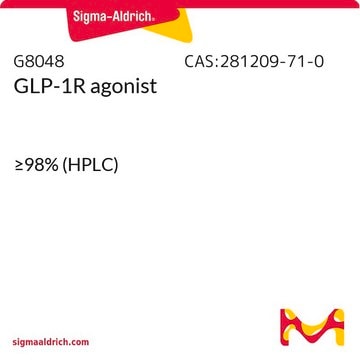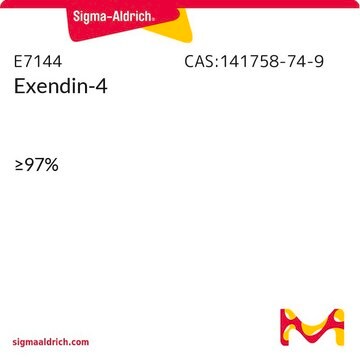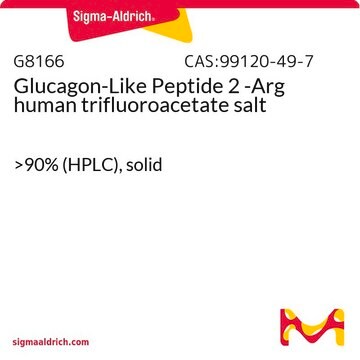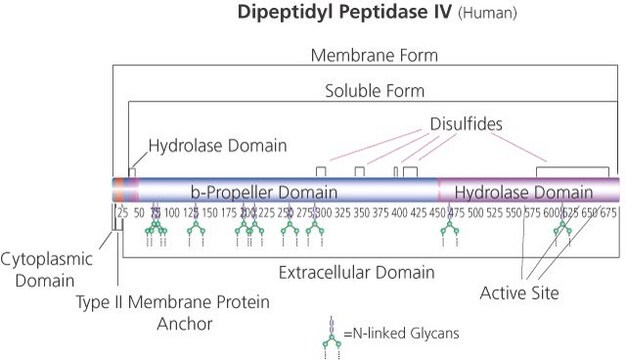G9416
Glucagon-Like Peptide 1 Fragment 7-37 human
≥96% (HPLC)
Synonym(s):
GLP-1, 7-37, Preproglucagon 78-108
About This Item
Recommended Products
Quality Level
Assay
≥96% (HPLC)
UniProt accession no.
storage temp.
−20°C
SMILES string
CC[C@H](C)[C@H](NC(=O)[C@H](Cc1ccccc1)NC(=O)[C@H](CCC(O)=O)NC(=O)[C@H](CCCCN)NC(=O)[C@H](C)NC(=O)[C@H](C)NC(=O)[C@H](CCC(N)=O)NC(=O)CNC(=O)[C@H](CCC(O)=O)NC(=O)[C@H](CC(C)C)NC(=O)[C@H](Cc2ccc(O)cc2)NC(=O)[C@H](CO)NC(=O)[C@H](CO)NC(=O)[C@@H](NC(=O)[C@H](CC(O)=O)NC(=O)[C@H](CO)NC(=O)[C@@H](NC(=O)[C@H](Cc3ccccc3)NC(=O)[C@@H](NC(=O)CNC(=O)[C@H](CCC(O)=O)NC(=O)[C@H](C)NC(=O)[C@@H](N)Cc4c[nH]cn4)[C@@H](C)O)[C@@H](C)O)C(C)C)C(=O)N[C@@H](C)C(=O)N[C@@H](Cc5c[nH]c6ccccc56)C(=O)N[C@@H](CC(C)C)C(=O)N[C@@H](C(C)C)C(=O)N[C@@H](CCCCN)C(=O)NCC(=O)N[C@@H](CCCNC(N)=N)C(=O)NCC(O)=O
InChI
1S/C151H228N40O47/c1-17-77(10)121(148(236)169-81(14)127(215)177-105(60-87-63-160-92-36-25-24-35-90(87)92)138(226)179-101(56-74(4)5)139(227)188-119(75(6)7)146(234)176-94(37-26-28-52-152)130(218)161-65-111(199)170-93(39-30-54-159-151(156)157)129(217)164-68-118(210)211)190-140(228)103(57-84-31-20-18-21-32-84)180-135(223)99(47-51-116(206)207)175-134(222)95(38-27-29-53-153)172-125(213)79(12)166-124(212)78(11)168-133(221)98(44-48-110(155)198)171-112(200)66-162-132(220)97(46-50-115(204)205)174-136(224)100(55-73(2)3)178-137(225)102(59-86-40-42-89(197)43-41-86)181-143(231)107(69-192)184-145(233)109(71-194)185-147(235)120(76(8)9)189-142(230)106(62-117(208)209)182-144(232)108(70-193)186-150(238)123(83(16)196)191-141(229)104(58-85-33-22-19-23-34-85)183-149(237)122(82(15)195)187-113(201)67-163-131(219)96(45-49-114(202)203)173-126(214)80(13)167-128(216)91(154)61-88-64-158-72-165-88/h18-25,31-36,40-43,63-64,72-83,91,93-109,119-123,160,192-197H,17,26-30,37-39,44-62,65-71,152-154H2,1-16H3,(H2,155,198)(H,158,165)(H,161,218)(H,162,220)(H,163,219)(H,164,217)(H,166,212)(H,167,216)(H,168,221)(H,169,236)(H,170,199)(H,171,200)(H,172,213)(H,173,214)(H,174,224)(H,175,222)(H,176,234)(H,177,215)(H,178,225)(H,179,226)(H,180,223)(H,181,231)(H,182,232)(H,183,237)(H,184,233)(H,185,235)(H,186,238)(H,187,201)(H,188,227)(H,189,230)(H,190,228)(H,191,229)(H,202,203)(H,204,205)(H,206,207)(H,208,209)(H,210,211)(H4,156,157,159)/t77-,78-,79-,80-,81-,82+,83+,91-,93-,94-,95-,96-,97-,98-,99-,100-,101-,102-,103-,104-,105-,106-,107-,108-,109-,119-,120-,121-,122-,123-/m0/s1
InChI key
GCYXWQUSHADNBF-AAEALURTSA-N
Gene Information
human ... GCG(2641)
Amino Acid Sequence
General description
Application
- as a positive control for insulin secretion of pancreatic islets
- to test its effect on insulin response in horse islets
- in combination with mesenchymal stem cells (MSCs) test its protective effects in myocardial infarction
Biochem/physiol Actions
Other Notes
Storage Class Code
11 - Combustible Solids
WGK
WGK 3
Flash Point(F)
Not applicable
Flash Point(C)
Not applicable
Personal Protective Equipment
Choose from one of the most recent versions:
Certificates of Analysis (COA)
Don't see the Right Version?
If you require a particular version, you can look up a specific certificate by the Lot or Batch number.
Already Own This Product?
Find documentation for the products that you have recently purchased in the Document Library.
Customers Also Viewed
Our team of scientists has experience in all areas of research including Life Science, Material Science, Chemical Synthesis, Chromatography, Analytical and many others.
Contact Technical Service











